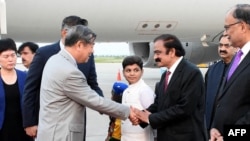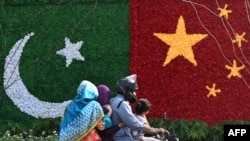A senior Chinese leader landed in Pakistan Sunday to attend a government-sponsored ceremony this week, marking the 10th anniversary of their infrastructure development collaboration under China's global Belt and Road Initiative.
He Lifeng, the Chinese vice premier and special presidential envoy, arrived in Islamabad amid tight security. The government declared a two-day holiday in the Pakistani capital starting Monday "to provide foolproof security" to the foreign delegation.
The foreign ministry said Lifeng's visit "reflects the importance" the two countries attached to deepen their bilateral ties further. It noted that Lifeng would be the chief guest "at an event celebrating the decade of CPEC" and hold meetings with the country's leadership.
The ministry referred to the China-Pakistan Economic Corridor or CPEC, which was introduced in July 2013 as a flagship project of the BRI.
Both countries say CPEC has brought more than $25 billion in direct Chinese investment to Pakistan, establishing power plants, developing the strategically located deep-water Pakistani port of Gwadar on the Arabian Sea, and building transport infrastructure.
"Over the past decade, as an important pioneering project of the BRI, CPEC has achieved fruitful results and become a new benchmark for the friendship between China and Pakistan," the Chinese foreign ministry said Saturday while announcing Lifeng's visit. The countries "are all-weather strategic cooperative partners and iron-clad friends," the ministry added.
CPEC aims to give landlocked western China the shortest possible access to international markets through the Gwadar port.
The mega undertaking has created nearly 200,000 direct local jobs, built more than 1,400 kilometers (870 miles) of highways and roads, and added 8,000 megawatts of electricity to the national grid, ending years of blackouts caused by power outages in the country of 230 million people.
Chinese Foreign Ministry spokesman Wang Wenbin told reporters in Beijing earlier this month that CPEC projects "are flourishing all across Pakistan," making a "tangible contribution" to the national development of the country and to regional connectivity.
But critics say many projects have suffered delays, including several much-touted industrial zones that were supposed to help Pakistan enhance its exports to earn much-needed foreign exchange.
The country's declining dollar reserves have prevented Islamabad from paying Chinese power producers, leading to strains in many ties.
Pakistan owes more than $1.26 billion (350 billion rupees) to Chinese power plants. The amount keeps growing, and China has been reluctant to defer or restructure the payment and CPEC debts. All the Chinese loans – both government and commercial banks – makeup nearly 30% of Islamabad's external debt.
Some critics blame CPEC investments for contributing to Pakistan's economic troubles. The government fended off the risk of an imminent default by securing a short-term $3 billion International Monetary Fund bailout agreement this month.
Security threats to its citizens and interests in Pakistan have also been a cause of concern for China. Militant attacks have killed several Chinese nationals in recent years, prompting Beijing to press Islamabad to ensure security measures for CPEC projects.
Diplomatic sources told VOA that China has lately directed its diplomats and citizens working on CPEC programs to strictly limit their movements and avoid visiting certain Pakistani cities for security reasons.
"They [Chinese] believe this security issue is becoming an impediment in taking CPEC forward," Senator Mushahid Hussain, the chairman of the defense committee of the upper house of the Pakistani parliament, told VOA in an interview earlier this month.
"Recurring expressions of concern about the safety and security of Chinese citizens and investors in Pakistan by top Chinese leaders indicate that Pakistan's promises of 'foolproof security' for Chinese working in Pakistan have yet to be fulfilled," said Hussain, who represents Prime Minister Shehbaz Sharif's ruling party in the Senate.





